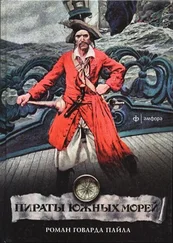Говард Пайл - Howard Pyle's Book of Pirates
Здесь есть возможность читать онлайн «Говард Пайл - Howard Pyle's Book of Pirates» — ознакомительный отрывок электронной книги совершенно бесплатно, а после прочтения отрывка купить полную версию. В некоторых случаях можно слушать аудио, скачать через торрент в формате fb2 и присутствует краткое содержание. Издательство: Иностранный паблик, Жанр: foreign_antique, foreign_prose, foreign_sf, на английском языке. Описание произведения, (предисловие) а так же отзывы посетителей доступны на портале библиотеки ЛибКат.
- Название:Howard Pyle's Book of Pirates
- Автор:
- Издательство:Иностранный паблик
- Жанр:
- Год:неизвестен
- ISBN:нет данных
- Рейтинг книги:4 / 5. Голосов: 1
-
Избранное:Добавить в избранное
- Отзывы:
-
Ваша оценка:
- 80
- 1
- 2
- 3
- 4
- 5
Howard Pyle's Book of Pirates: краткое содержание, описание и аннотация
Предлагаем к чтению аннотацию, описание, краткое содержание или предисловие (зависит от того, что написал сам автор книги «Howard Pyle's Book of Pirates»). Если вы не нашли необходимую информацию о книге — напишите в комментариях, мы постараемся отыскать её.
Howard Pyle's Book of Pirates — читать онлайн ознакомительный отрывок
Ниже представлен текст книги, разбитый по страницам. Система сохранения места последней прочитанной страницы, позволяет с удобством читать онлайн бесплатно книгу «Howard Pyle's Book of Pirates», без необходимости каждый раз заново искать на чём Вы остановились. Поставьте закладку, и сможете в любой момент перейти на страницу, на которой закончили чтение.
Интервал:
Закладка:
Other buccaneers followed him. Campeche was taken and sacked, and even Cartagena itself fell; but with Henry Morgan culminated the glory of the buccaneers, and from that time they declined in power and wealth and wickedness until they were finally swept away.
The buccaneers became bolder and bolder. In fact, so daring were their crimes that the home governments, stirred at last by these outrageous barbarities, seriously undertook the suppression of the freebooters, lopping and trimming the main trunk until its members were scattered hither and thither, and it was thought that the organization was exterminated. But, so far from being exterminated, the individual members were merely scattered north, south, east, and west, each forming a nucleus around which gathered and clustered the very worst of the offscouring of humanity.
The result was that when the seventeenth century was fairly packed away with its lavender in the store chest of the past, a score or more bands of freebooters were cruising along the Atlantic seaboard in armed vessels, each with a black flag with its skull and crossbones at the fore, and with a nondescript crew made up of the tags and remnants of civilized and semicivilized humanity (white, black, red, and yellow), known generally as marooners, swarming upon the decks below.
Nor did these offshoots from the old buccaneer stem confine their depredations to the American seas alone; the East Indies and the African coast also witnessed their doings, and suffered from them, and even the Bay of Biscay had good cause to remember more than one visit from them.
Worthy sprigs from so worthy a stem improved variously upon the parent methods; for while the buccaneers were content to prey upon the Spaniards alone, the marooners reaped the harvest from the commerce of all nations.
So up and down the Atlantic seaboard they cruised, and for the fifty years that marooning was in the flower of its glory it was a sorrowful time for the coasters of New England, the middle provinces, and the Virginias, sailing to the West Indies with their cargoes of salt fish, grain, and tobacco. Trading became almost as dangerous as privateering, and sea captains were chosen as much for their knowledge of the flintlock and the cutlass as for their seamanship.
As by far the largest part of the trading in American waters was conducted by these Yankee coasters, so by far the heaviest blows, and those most keenly felt, fell upon them. Bulletin after bulletin came to port with its doleful tale of this vessel burned or that vessel scuttled, this one held by the pirates for their own use or that one stripped of its goods and sent into port as empty as an eggshell from which the yolk had been sucked. Boston, New York, Philadelphia, and Charleston suffered alike, and worthy ship owners had to leave off counting their losses upon their fingers and take to the slate to keep the dismal record.
"Maroon – to put ashore on a desert isle, as a sailor, under pretense of having committed some great crime." Thus our good Noah Webster gives us the dry bones, the anatomy, upon which the imagination may construct a specimen to suit itself.
It is thence that the marooners took their name, for marooning was one of their most effective instruments of punishment or revenge. If a pirate broke one of the many rules which governed the particular band to which he belonged, he was marooned; did a captain defend his ship to such a degree as to be unpleasant to the pirates attacking it, he was marooned; even the pirate captain himself, if he displeased his followers by the severity of his rule, was in danger of having the same punishment visited upon him which he had perhaps more than once visited upon another.
The process of marooning was as simple as terrible. A suitable place was chosen (generally some desert isle as far removed as possible from the pathway of commerce), and the condemned man was rowed from the ship to the beach. Out he was bundled upon the sand spit; a gun, a half dozen bullets, a few pinches of powder, and a bottle of water were chucked ashore after him, and away rowed the boat's crew back to the ship, leaving the poor wretch alone to rave away his life in madness, or to sit sunken in his gloomy despair till death mercifully released him from torment. It rarely if ever happened that anything was known of him after having been marooned. A boat's crew from some vessel, sailing by chance that way, might perhaps find a few chalky bones bleaching upon the white sand in the garish glare of the sunlight, but that was all. And such were marooners.
By far the largest number of pirate captains were Englishmen, for, from the days of good Queen Bess, English sea captains seemed to have a natural turn for any species of venture that had a smack of piracy in it, and from the great Admiral Drake of the old, old days, to the truculent Morgan of buccaneering times, the Englishman did the boldest and wickedest deeds, and wrought the most damage.
First of all upon the list of pirates stands the bold Captain Avary, one of the institutors of marooning. Him we see but dimly, half hidden by the glamouring mists of legends and tradition. Others who came afterward outstripped him far enough in their doings, but he stands pre-eminent as the first of marooners of whom actual history has been handed down to us of the present day.
When the English, Dutch, and Spanish entered into an alliance to suppress buccaneering in the West Indies, certain worthies of Bristol, in old England, fitted out two vessels to assist in this laudable project; for doubtless Bristol trade suffered smartly from the Morgans and the l'Olonoises of that old time. One of these vessels was named the Duke , of which a certain Captain Gibson was the commander and Avary the mate.
Away they sailed to the West Indies, and there Avary became impressed by the advantages offered by piracy, and by the amount of good things that were to be gained by very little striving.
One night the captain (who was one of those fellows mightily addicted to punch), instead of going ashore to saturate himself with rum at the ordinary, had his drink in his cabin in private. While he lay snoring away the effects of his rum in the cabin, Avary and a few other conspirators heaved the anchor very leisurely, and sailed out of the harbor of Corunna, and through the midst of the allied fleet riding at anchor in the darkness.
By and by, when the morning came, the captain was awakened by the pitching and tossing of the vessel, the rattle and clatter of the tackle overhead, and the noise of footsteps passing and repassing hither and thither across the deck. Perhaps he lay for a while turning the matter over and over in his muddled head, but he presently rang the bell, and Avary and another fellow answered the call.
"What's the matter?" bawls the captain from his berth.
"Nothing," says Avary, coolly.
"Something's the matter with the ship," says the captain. "Does she drive? What weather is it?"
"Oh no," says Avary; "we are at sea."
"At sea?"
"Come, come!" says Avary: "I'll tell you; you must know that I'm the captain of the ship now, and you must be packing from this here cabin. We are bound to Madagascar, to make all of our fortunes, and if you're a mind to ship for the cruise, why, we'll be glad to have you, if you will be sober and mind your own business; if not, there is a boat alongside, and I'll have you set ashore."
The poor half-tipsy captain had no relish to go a-pirating under the command of his backsliding mate, so out of the ship he bundled, and away he rowed with four or five of the crew, who, like him, refused to join with their jolly shipmates.
The rest of them sailed away to the East Indies, to try their fortunes in those waters, for our Captain Avary was of a high spirit, and had no mind to fritter away his time in the West Indies, squeezed dry by buccaneer Morgan and others of lesser note. No, he would make a bold stroke for it at once, and make or lose at a single cast.
Читать дальшеИнтервал:
Закладка:
Похожие книги на «Howard Pyle's Book of Pirates»
Представляем Вашему вниманию похожие книги на «Howard Pyle's Book of Pirates» списком для выбора. Мы отобрали схожую по названию и смыслу литературу в надежде предоставить читателям больше вариантов отыскать новые, интересные, ещё непрочитанные произведения.
Обсуждение, отзывы о книге «Howard Pyle's Book of Pirates» и просто собственные мнения читателей. Оставьте ваши комментарии, напишите, что Вы думаете о произведении, его смысле или главных героях. Укажите что конкретно понравилось, а что нет, и почему Вы так считаете.












